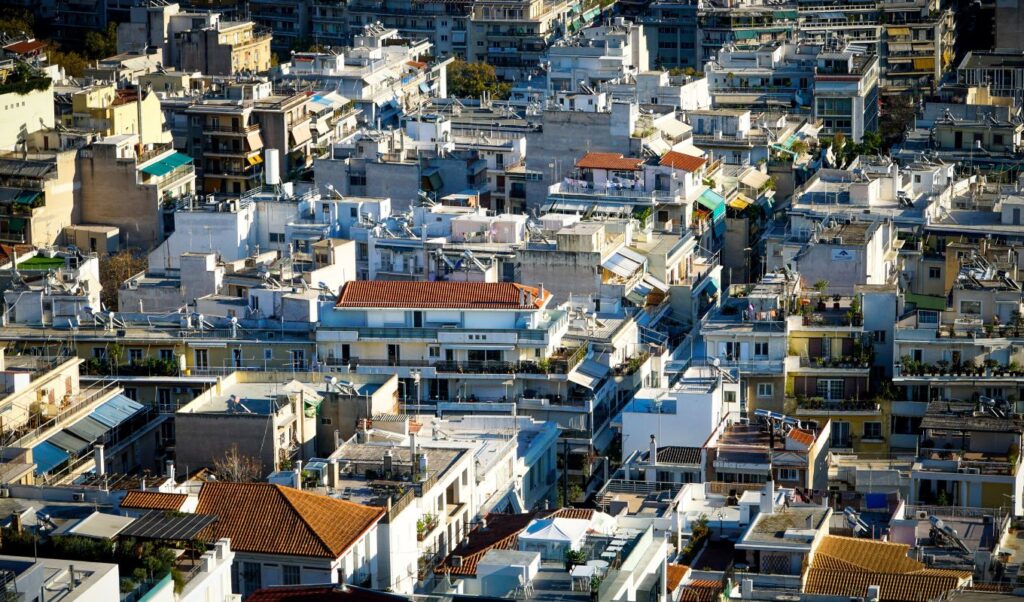Millions of property owners across the country risk seeing their assets completely devalued if the ability to regularize building violations and change building usage is not extended. The critical deadline expires in nine months, specifically on March 31, 2026, creating anxiety about the future of thousands of properties.
This is what the president of POMIDA, lawyer Stratos Paradias, argues in speaking to “NEA”. The compilation of the Electronic Building Identity has revealed that in practice, there is no apartment, shop, office, or warehouse that does not present some deviation from the building permit plans or differentiation in its use.
According to the POMIDA president, most unauthorized constructions and usage changes in apartment buildings were not made by current owners. That’s why current owners, whether they are heirs or buyers, don’t even know about it.
“They learn about it with surprise from engineers when inspections and detailed measurements are conducted for the issuance of the Electronic Identity, in preparation for drafting some contract. They then become indignant when they get involved in the process of building violation regularization as well as the corrective declaration in E9, to their municipality and to the new Property Registries that are coming at full speed” he adds.
The “lucky” and “unlucky” property owners
But these are the “lucky ones,” according to the POMIDA president. The “unlucky ones,” as he points out, will be all the remaining owners, whose properties will be completely devalued if the ability to regularize building violations stops being valid and they won’t be able to do anything about it anymore.
Civil engineer (NTUA) and technical advisor of POMIDA, Kostas Karampabas, presents to Nea the 7 reasons why owners should not be deprived of the right to regularize unauthorized constructions and usage changes in their buildings.
Seven serious reasons for extending building violation regularization
- All property transfers will be blocked. To carry out a lifetime transfer of any property, the compilation of the Electronic Identity is necessary, which has as a prerequisite that any unauthorized constructions or usage changes have been regularized. This means that from April 1, 2026, properties with irregularities that have not been regularized are automatically excluded from lifetime transfers, resulting in the “freezing” and devaluation of the real estate wealth of millions of citizens.
- Inherited properties will be devalued. The properties of those who inherited buildings that unknowingly had unauthorized constructions will also be devalued, since from April 1, 2026, they will be able to accept inheritance but will not have the right to regularize them and consequently sell them or transfer them through parental provision to their children.
- In the midst of a housing crisis, serious licensed home renovations cannot be carried out. Due to the prolonged crisis that the construction sector in our country went through, resulting in limited new construction, combined with the increase in property sale prices and rents, citizens have turned to renovating existing homes for owner-occupation or rental.
- Inclusion in energy upgrade programs will not be possible. All state and European energy upgrade programs for homes have as a prerequisite the regularization of building violations and usage changes in the included buildings. Therefore, from April 1, 2026, all homes with unregularized violations or usage changes will not be able to be included in any such program with obvious consequences for their functionality and ultimately their value.
- Erroneous contracts cannot be corrected. In October 2024 (Article 16 of Law 5142/2024), the opportunity was given for unilateral correction of horizontal property establishment acts and contract corrections that had been signed until May 1, 2024, based on incomplete and erroneous regularizations and engineer certifications.
- Penalties will begin to be imposed. Until the complete recording of properties in the National Cadastre, the new Unified Property Registry of the National Cadastre, and the Property Ownership and Management Registry (MIDA) platform of AADE is fully completed, the possibility of urban planning regularization must remain open.
- The country will be filled with thousands of abandoned buildings. The necessary general extension of the regularization deadline should also include again the possibility of regularizing Category 5 violations (large unauthorized constructions) which has been abolished since September 2020, resulting in our country already being filled with thousands of abandoned and devalued buildings.




